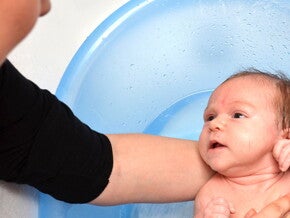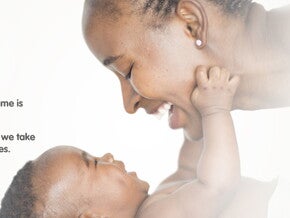
At Three Months
At Three Months
Your baby lifts his head up when lying on his tummy. His hands can grasp a small rattle, and he has started laughing.
- Give him textures to feel – a sponge, velvet, something hard or soft.
- Allow your baby to lie on his tummy on a firm surface to encourage him to lift his neck.
SOCIAL DEVELOPMENT
He communicates with face and body; smiles, frowns, grimaces.
COGNITIVE DEVELOPMENT
He follows moving objects; recognises objects and people.
Related articles

Common concerns in the first days
Physiological jaundice
5 mins to read

Your baby’s appearance at birth
Many parents are surprised or even alarmed at the sight of their newborn. It is important to understand that the effects of birth are usually temporary and the baby’s looks improve rapidly.
5 mins to read

At Six Weeks
Your baby will smile deliberately, especially for his parents. He can hold his head up momentarily, and focus on and follow moving objects.
5 mins to read

At Two Months
By 2 months, he can lift his head when on his tummy and hold his head up when held at his shoulder.
5 mins to read

Emotional development in Your Baby
Your baby is discovering their emotions from birth.
3 mins to read

At Four Months
Baby is growing and getting excited about, well, just about everything. Especially playtime and all the things hands can touch. Hands are so fascinating!
5 mins to read

At Five Months
He starts to roll over from his tummy onto his back.
5 mins to read

Postnatal exercise progressions
Check your basic progressive exercise programme with your caregiver.
5 mins to read

Baby bottle feeding equipment
you have decided to bottle feed your baby
1 min to read

Rashes
A young baby’s skin passes through many phases, from clear to spotty (rash), to peach-like. This may be due to the transition from a protected environment in the womb to the outside world.
5 mins to read

Baby Thrush
Thrush is a fungal infection and can be found in your baby’s mouth, nappy area or under the chin. The fungus lives on the skin and usually causes no harm, but when conditions are favourable,&n
2 mins to read

Breastfeeding Videos
A Breastfeeding experience which is enjoyable and beneficial to both mom and b
5 mins to read

Bathing
Use your hospital stay to learn how to bath your baby. Babies usually have their first bath about an hour after birth.
5 mins to read

Immunisation
The aim of immunisation is to prevent disease. It protects the community as well as individuals.
5 mins to read

Crying
A new baby cries a great deal of the time. It is her only way of communicating. It is difficult at first to know why she cries, but your ability to interpret her cries will improve with time.
5 mins to read

Check-up
A general physical and gynaecological examination is advised 4–6 weeks after delivery to assess your recovery and the return of your body to its non-pregnant state.
1 min to read

Schedule and routines
Routines are difficult to establish with a new baby. You may feel as if your life revolves around the insatiable needs of your baby.
5 mins to read

